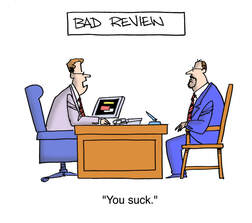 Authors have a bit of a love-hate relationship with reviews. We all want them, because we know that reviews help to sell our books. But we don’t want the bad reviews, because they have the opposite effect, or so we believe. But the one thing an author can’t predict, is how any reader will view their work. No matter how good your book is, there is almost certainly going to be someone who doesn’t like it. Regular readers of this blog will recall the one where we noted Oscar Wilde’s less-than-charitable views on Dickens’ book “The Old Curiosity Shop” and Dickens was considered to be a giant of the Victorian literary world.  That’s the problem with reviews, we have no control over them. But a bad review can serve a purpose for an author. If we can identify what the reader didn’t like about our book, we can make sure we don’t do the same thing next time. After all, the definition of insanity is doing the same thing over and over and expecting a different result, so bad reviews provide learning opportunities. And if you are the sort of author that thinks they have nothing to learn from readers, you are probably doomed to get bad reviews forever. As a reader I do take a look at reviews, but I don’t actually read that many of them. You may think that is a bit odd, to look at them but not read them, but there is method in my madness. I mainly look at the split between the good reviews and the bad ones. If there are more good reviews than bad, then I’ll probably give the book a chance.  I do sometimes look at the bad reviews, to find out why the readers didn’t like the book. But I am very selective about the ones to which I pay attention. If a bad review is well written, in good English and provides valid reasons for why the reader didn’t like the book, then I’ll take it seriously. But if the bad review is just a short sentence which is mainly abuse, or if it’s written in a style that's the internet equivalent of a blunt crayon, then I don't take it seriously. I started using this method a few years ago, after reading hotel reviews on TripAdvisor. If someone has given a hotel a bad review, when everyone else seemed to be fine with it, then there has to be a valid reason (or so I thought).  I’ll give you an example. We were going to visit Crete and wanted a nice hotel, but at a budget price. I found one that seemed to fit the bill and started reading the reviews. Most people were very positive about the hotel, but there were a few one-star reviews, which worried me a little. So I looked at one of them. The author of the review complained bitterly about a road running between the hotel and the beach. Apparently, the hotel’s website hadn’t mentioned it and he thought that he should have been told about it, as the hotel was listed as “beachfront”.  Well, we booked that hotel anyway, because both the location and price were right. And the road? Well, we expected to find a six-lane superhighway with cars whizzing up and down all day and all night at 100 mph. What we found was a very narrow road used to service the beachfront hotels and the number of vehicles using it each hour could probably be counted using the fingers of one hand. And they were being driven with caution. It took three paces to cross it (I counted them) and there we were, on the beach. So how was the hotel otherwise? It was OK. Actually, it was more than OK. We had a very nice week, ate some good food (OK, it wasn’t Michelin star standard, but it was tasty and plentiful) and drank some nice wine and all within our budget. We were happy to post a 4-star review after we got home. And that’s why reviews have to be treated with caution, especially the bad ones. People get upset about the strangest things and they take it out on whoever is handy. In the case of TripAdvisor, it’s the poor hotel owners who bear the brunt and in the case of books it’s the author of the book they just read.  So, if you are an author and you get the odd bad review, please remember that you can’t please everyone. And if you are a reader, please remember that if the majority of other readers thought a book was worth four or five stars, then it is probably worth giving it a go. And if you are a reader who is going to post a bad review, please make sure that the standard of English you use is at least as good as that of the author you are about to criticise. It also helps considerably to say why you didn’t like the book. You will have your reasons, and the whole purpose of the review system is to share those reasons with others. Is there a “good way” of writing a book review? Author Luisa Plaja offers this advice.  Write a couple of sentences telling the reader what the book is about. Keep it short and simple; this shouldn’t become a synopsis of the book. For those readers familiar with the term “elevator pitch”, think about it like that. Tell the readers what you liked about the book. Even the worst books have some redeeming features, so make sure you write about those. After all, the author deserves praise for giving you the things you enjoy.  Tell the readers what you didn’t like about the book. This is the justification for awarding anything below 5 stars for the review. Even if you still award 5 stars, there may be something that you didn’t like, even if it was only a minor flaw. Be quite specific about what you did and didn’t like. Was it a character? Was it something in the plot? Was it the author’s use of language? Focus on why you didn’t like whatever it was, because that is what people always want to know. Whatever it was, the author may benefit from your insights and they can then correct the issue in their next book – which means you get to read better books. Obviously, the balance between the lengths of the paragraphs describing what you liked and what you didn’t like should reflect how you felt about the book as a whole. If you liked the book, then the “good” paragraph will be far longer than the “bad” paragraph.  Summarise your review with your overall impressions. If you are mainly positive, then your summary should also be positive and vice versa. But don’t just repeat the previous paragraphs. Although Luisa Pelja doesn’t mention it, we think it is helpful to mention the genre of the book up front. After all, readers don’t want to waste their time reading a review of a book they are unlikely to buy because it isn’t in their preferred genre. Here at Selfishgenie, we also make our recommendations clear: yes, definitely read this book if you like this sort of thing, or no, steer well clear. Is there anything a reader shouldn’t put in a review. Luisa Pelja doesn’t offer any advice on that, so we will.  Don’t be abusive. First of all, the author didn’t set out to write a bad book so they shouldn’t be abused for trying their best. Secondly, your opinion of the book is just that: an opinion. It isn’t a fact. Abuse isn’t constructive – it’s destructive. There is no beauty in destruction. Finally, abuse tells the world more about the abuser than the abused. The book reviews we publish on our website mainly conform to the format described by Luisa Peljac, but we do go further. That is because our reviews are also blogs. They are intended to go further than just looking at the book; they also provide information about the author, what sort of people may enjoy the book and maybe a few homespun stories about how the reviewer stumbled across the book in the first place. But for reviews that are posted on Amazon, Goodreads etc we stick to the basic format described above. And finally, if you have enjoyed this blog, found it entertaining or informative (or maybe all of those), be sure not to miss the next edition by signing up for our newsletter. We promise not to spam you. Just click the button.
0 Comments
Leave a Reply. |
AuthorThis blog is compiled and curated by the Selfishgenie publishing team. Archives
June 2025
|
 RSS Feed
RSS Feed